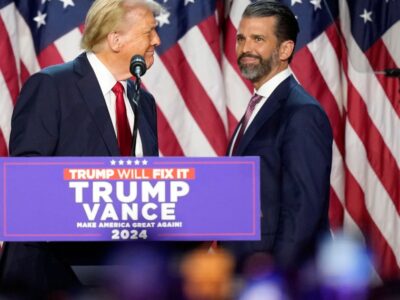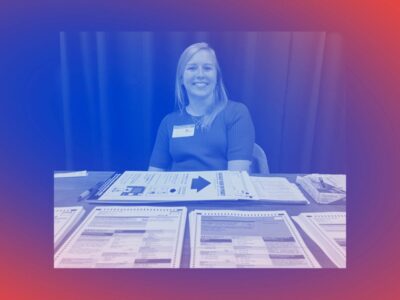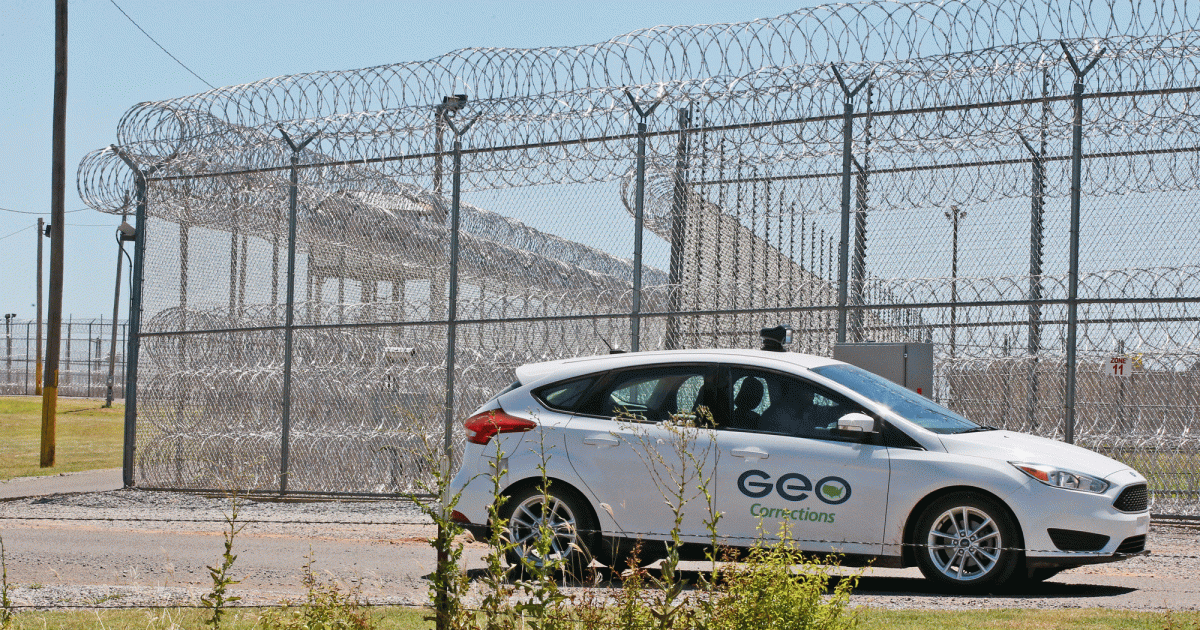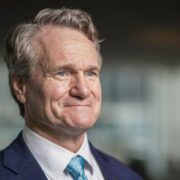
This story was published in partnership with the Center for Public Integrity, a newsroom that investigates inequality
ABERDEEN, Wash.—Under an overcast sky, Patty Flores led a group of colleagues to an empty lot in the mobile home park where she lived. A bare patch of grass traced the outline of a home set ablaze in an electrical fire.
She saw it as a symptom of a larger problem, one that connected to her rising rent, the potholes pockmarking the street, and the paradox that taking another job to cover the extra rent would require child care that she couldn’t afford.
The tax system in her state has long been one of the most inequitable in the country, leaning most heavily on the people with the least money. That, in turn, means less revenue to spend on services that can help people live less tenuous lives.
“I want to trust that there will be change,” Flores said. “I want a better life for my kids.”
When legislators proposed a bill in 2021 to increase taxes on Washington’s wealthiest residents and put the money toward child care and education, Flores was elated. She showed up to testify in support.
The bill passed. This year, the money started flowing in—hundreds of millions more than legislators anticipated.
While efforts to pass a federal wealth tax are at a standstill, a nascent movement at the state level to get high-income people to contribute more to public coffers is beginning to notch successes.
Washington state’s tax, on capital gains, overcame a court challenge in March. Massachusetts voters amended their constitution in November to tax millionaires at a higher rate. And legislators in eight more states introduced bills this year aimed at reforming tax systems that take a smaller share of household income from people with the most money than from people with the least. Those changes would yield hundreds of billions of dollars in potential new revenue.
But this push is a far cry from the decades-long conservative effort to reduce taxes, particularly ones that higher-income people pay.
Most of the recent tax-the-wealthy proposals never made it out of committee. The Washington and Massachusetts measures took years of efforts organized by local groups facing well-funded opposition.
The State Innovation Exchange and State Revenue Alliance, two national groups now helping to coordinate state wealth-tax efforts, are outspent by billionaire-funded organizations that argue for yet more cuts.
“The reality is wealthy people across this country wield enormous political power in terms of lobbyists, think tanks, and organizations created to entrench their financial advantage,” said Kyle Huelsman, senior director of legislative affairs at the State Innovation Exchange.
“We are really in a generational fight, and an incredibly disproportionate fight in terms of resources.”
Washington and Massachusetts offer lessons for states wanting to make their tax systems more equitable. A big one: Drumming up the support can take a long time—and a lot of money.
In Massachusetts, a constitutional amendment to increase taxes on the wealthy took a decade of advocacy work. Supporters gathered signatures to put it on the 2018 ballot, only to see it booted off by a court ruling after business groups sued. The Legislature then put it on the 2022 ballot, bypassing restrictions that doomed the other attempt.
A key reason that states take a higher share of household income from their lower-income residents than their wealthiest is sales tax. An income tax with different brackets—rates that go up as your income does—is the main tool states have to counterbalance that impact.
Massachusetts didn’t design its income tax that way. It had a single rate across income levels since its enactment in 1916 because its constitution required it.
That’s what the proposed amendment that went before voters in 2022 aimed to change. It called for an additional 4% income tax for millionaires on top of the state’s 5% flat tax. The proposal specified that revenue would go toward schools, public transportation, roads and bridges, more than 650 of which need repair.
Labor, community, and faith groups joined forces to support the ballot measure. Business interests and conservatives lined up in opposition.
The latter organized the Coalition to Stop the Tax Hike Amendment and raised more than $14 million to defeat it, with funders that included billionaires Jim Davis, the chairman of New Balance, and New England Patriots owner Robert Kraft, through his containerboard company. The Boston-based Pioneer Institute, a member of the State Policy Network, which advocates for tax cuts around the nation, wrote a book in opposition—“Back to Taxachusetts?”
While the money flowing to national tax-cutting groups is substantial, supporters of the Massachusetts amendment outspent the opposition. They did it by raising more than $32 million as Fair Share Massachusetts, a large part from teachers’ unions and other worker-funded groups.
The conservative State Policy Network and its affiliates know that unions can be a key counterweight to the struggle over taxes. The groups’ solution: Cut off their opponents’ funding at the source.
In a 2016 fundraising letter reported on by The Guardian, the State Policy Network said that “freeing teachers and other government workers from coercive unionism” would mean “permanently depriving the Left of access to millions of dollars in dues.”
Two of the network’s partner organizations provided free legal representation in a lawsuit that produced the 2018 U.S. Supreme Court ruling weakening public unions’ ability to collect membership fees.
But that didn’t stave off a big-money battle in Massachusetts. Once the ballot measure survived a trip to the state’s high court, the decision was up to voters.
Both coalitions made their pitch as the November election loomed.
The Stop the Tax Hike group argued that the measure would impose one of the largest tax increases in state history, that the revenue could be put toward spending beyond the intended purposes, and that the results would leave small business owners “reeling from an unprecedented new financial hit.”
The Fair Share group pointed to Massachusetts Budget and Policy Center data showing that the wealthiest residents paid an average of 6.8% of their income in state and local taxes, while everyone else paid an average of 8.9%. Changing that, the group said, “is how we build an economy that works for everyone.”
“It became a pure tax justice argument,” said Phineas Baxandall, policy director of the Massachusetts Budget and Policy Center. “The richest need to pay their fair share.”
Voters approved the amendment, 52% to 48%.
The Pioneer Institute vowed to track the tax’s impact. State and national teachers’ unions “claimed that it would be a net benefit for the state. However, they ignore the negative impact on the overall economy while at the same time avoiding accountability when it comes to how those dollars are spent and whether or not we are doing a better job of educating our children,” Mary Connaughton, the group’s director of government transparency and chief operating officer, said in an email.
For Huelsman, Massachusetts demonstrated what’s possible.
“They really put out the guiding light of an incredibly popular issue,” he said.
Taxing wealthy people at higher rates than residents with less money isn’t a novel idea. That’s how the federal income tax is designed to work. But Congress has cut top tax rates in big ways over the past four decades, contributing to the growing gap between the rich and everyone else.
And the US doesn’t impose an annual tax on wealth, a person’s assets. A ProPublica investigation showed that loopholes in the system allow the country’s richest people to pay very low tax rates, when they owe anything at all.
Several other countries impose wealth taxes. In Norway, for instance, such taxes are levied up to 1.1%. Switzerland’s cantons—semi-sovereign states—have had them since the early 18th century, accounting for nearly 10% of canton and local tax revenues in 2018. Colombia and Spain both approved wealth taxes last year, the latter for 2023 and 2024 only.
In the United States, though, proposals for a tax on the ultrarich, including from Democrats Sen. Elizabeth Warren of Massachusetts and Rep. Pramila Jayapal of Washington have stalled in Congress. That’s despite polling showing that the majority of Americans support the concept.
And in the past two years, at least 19 states have lowered their income taxes in ways that primarily benefit their most well-off residents, pushed along by conservative groups that include the State Policy Network.
All of that is energizing legislators and activists in Democratic-led states to band together to try to increase taxes on the wealthy—in some cases with actual wealth-tax proposals.
On January 19, elected officials in eight states—Connecticut, New York, California, Washington, Hawaii, Maryland, Illinois, and Minnesota—introduced legislation or held rallies for bills filed afterward. In March, Nevada legislators proposed a study on wealth taxes. It was the first public effort of a movement organized by the State Innovation Exchange and State Revenue Alliance to move the needle on tax parity.
They set the stage last summer, convening activists, think tanks, and lawmakers from 10 states to strategize. Formed in 2014, State Innovation Exchange provides lawmakers with research, training, strategy, and policy guidance to advance progressive legislation.
“One of the things that we saw really clearly in those conversations” was that “fights around wealth taxes were very siloed in individual states,” State Innovation Exchange’s Huelsman said. “But at the same time, the problem is very much felt across every state in the country in terms of the ultrawealthy avoiding taxes.”
The cohort met virtually once a month through April to share best practices and lessons learned. They’re planning an in-person meeting in September and are looking to add people from additional states.
How long it might take to see results outside of Massachusetts’ “millionaire tax” and Washington state’s capital gains tax remains to be seen. None of the proposals introduced this year have become law, and the infrastructure built to produce more tax cuts, especially tax cuts aimed at high-income people, is better funded.
According to 2021 tax filings, the most recent available, the State Innovation Exchange had just over $9 million in revenue. The fledgling State Revenue Alliance said it had about $2 million.
Meanwhile, that same year, revenue at the conservative American Legislative Exchange Council (ALEC) and the State Policy Network was about $35 million combined. That doesn’t count the network’s state affiliates, which also raise money to advocate for tax cuts.
And Americans for Prosperity, an influential State Policy Network partner whose lobbying efforts include tax cuts, had revenue of nearly $114 million.
They’re only some of the groups in the fight. Among U.S. think tanks conducting tax policy research or advocacy, organizations on the right have two-and-a-half times the money of the ones on the left, according to a 2020 study published in the Nonprofit Policy Forum journal.
ALEC and Americans for Prosperity did not respond to requests for comment. The State Policy Network, while not answering questions about funding disparities, characterized its tax-cut efforts as sensible.
“States have received record amounts of revenue in every year since the coronavirus pandemic,” Michael Lucci, State Policy Network visiting economy policy fellow, said in a statement provided to the Center for Public Integrity. “Cutting taxes provides relief and allows revenues to grow a bit less quickly than they otherwise would. Even some states that are not cutting taxes have struggled to figure out what to do with all the excess revenue.”
Temporary infusions of federal pandemic aid are part of the reason. Opponents of the tax cuts argue that budget consequences will follow.
“The same people and organizations who patiently packed the courts with judges who would take away our rights are the same who are making it harder to raise revenue for what our communities need,” Kristen Crowell, executive director of the State Revenue Alliance, said in an email. “For them, it’s a business decision—spend millions to avoid paying billions in taxes. For us, tax justice is woven into the fight for democracy, racial and economic justice.”
In 2019, Flores from Aberdeen went door to door, listening to low-wage workers in Washington state’s timber country talk about the problems they saw and the solutions they wanted.
Flores was volunteering for Firelands Workers Action, a group that organizes and advocates on behalf of working people in rural and small-town swaths of the state.
The survey results from over 200 conversations revealed pressing worries about affordable housing, health insurance, mounting disasters like wildfires and “impossible choices.”
“When the fires were coming through, they just had one cop car coming around to tell us to evacuate,” a veteran told Firelands volunteers. “No help getting out, nothing.” A social worker said that she paid as much for child care as she did on her mortgage. Asked what they thought should be done to help fix the challenges their communities faced, 69% of respondents said they supported taxing the rich.
In Washington state, “we live and breathe the regressive tax system every day through the many different ways we’re seeing our communities facing decades of disinvestment,” said Firelands’ executive director, Stina Janssen.
The nonprofit’s workers and volunteers sought to change that. They wanted to see investment by the state—one of nine without an income tax—that would usher in more affordable housing and public child care.
But there’s a history of pushback in the state when people have tried to change the tax system.
In the early 20th century, the state relied on revenue from property taxes to fund the government— largely through farmland. But by 1930, the farm population dropped by nearly a third, placing a disproportionate amount of the tax burden on farmers’ shoulders. Many were unable to pay.
A fraternal group called the Washington State Grange, which fought for the improvement of farmers’ lives through political action, spent years trying to get an income tax enacted. A ballot measure the group spearheaded passed by more than 70% of the vote in 1932.
The Washington State Supreme Court overturned it the next year, arguing that its graduated rates violated the state constitution’s requirement “that all taxes shall be uniform upon the same class of property.” The high court did the same to another attempt a few years later.
The justices left intact new sales, business, and occupation taxes. Washington’s system has largely been the same ever since: It relies heavily on state and local sales taxes that average more than 9%— among the nation’s highest. That’s why it leans hardest on the poor.
Washington’s constitutional requirement that all taxes be “uniform” has a backstory rooted in inequity: Slaveholders in Southern states pushed for the policy as a lucrative loophole.
“The 'personal property' at issue in the adoption of the first uniformity clauses was not commercial wealth, tangible or intangible,” Robin Einhorn of the University of California, Berkeley, wrote in a Journal of Economic History article. “It was slaves.”
Uniformity clauses spread from there. But Massachusetts and Washington are among the few states where courts have interpreted it to prohibit different tax rates.
Tax policy has been “used as a weapon against overburdened communities, especially the Black community,” said Sen. Joe Nguyễn, a Democrat who represents a Seattle-area district. “So for me, our tax structure is rooted in racism, is rooted in economic division, but it’s also a way for us to heal some of that from the past as well.”
Efforts in the early 2000s again fell short, including a ballot measure for a tax on the wealthy that failed after two of the state’s wealthiest residents helped fund the opposition in 2010.
A decade later, Firelands and other tax reform proponents set their sights on capital gains. This time, they aimed for a clear message and strong public support.
The 2021 bill filed from that effort called for levying a 7% tax on profits exceeding $250,000 from the sale and exchange of assets such as stocks and bonds. Lawmakers earmarked the revenue for early childhood education.
More than 100 groups, including labor unions, human service organizations and immigrant rights nonprofits, teamed up to push the legislation forward. As soon as the Legislature passed it, several Washington residents represented in part by a State Policy Network affiliate, the Freedom Foundation, filed a lawsuit challenging the policy.
“Washington has long benefited from its status as one of the few states without an income tax, though attempts by the political Left to impose one have continued unabated for about 90 years,” the Freedom Foundation’s director of labor policy, Maxford Nelsen, wrote in a statement at the time. The group didn’t respond to requests for comment.
Flores, recalling that lawsuit, switched from English to Spanish at the Firelands office as Janssen, Firelands’ executive director, provided translation. “So even as the common people are making a small incremental advancement, we see that some wealthy people are strategizing to repeal and roll back even that win,” she said. “We’ve suffered for so many years.”
But this time, when the case reached Washington’s high court, its ruling allowed the tax to stand.
As of May, the state had raised more than triple the expected amount, with nearly $850 million collected from 3,190 payments. The first $500 million of annual revenue will go toward child care and early learning programs. The remainder will fund school construction.
Those results inspired advocates in Hawaii, one of the states where wealth tax and capital gains tax legislation was proposed this year.
“We can point to that and say, ’Look at this huge success,’” said Will Caron with Hawaiʻi Appleseed Center for Law & Economic Justice.
In Flores’ blue mobile home, mold stretched along the walls and ceiling. She feared it caused the respiratory problems plaguing her then 4-year-old son, Mathias.
Flores wanted to move into a single-family home with proper insulation. That, she thought, would be the end of her constant worries about mold. But the three-bedroom homes in her area cost around $200,000.
“How am I supposed to pay when the wages are so low?” asked Flores, who was working two part-time jobs, at Firelands and a grocery store.
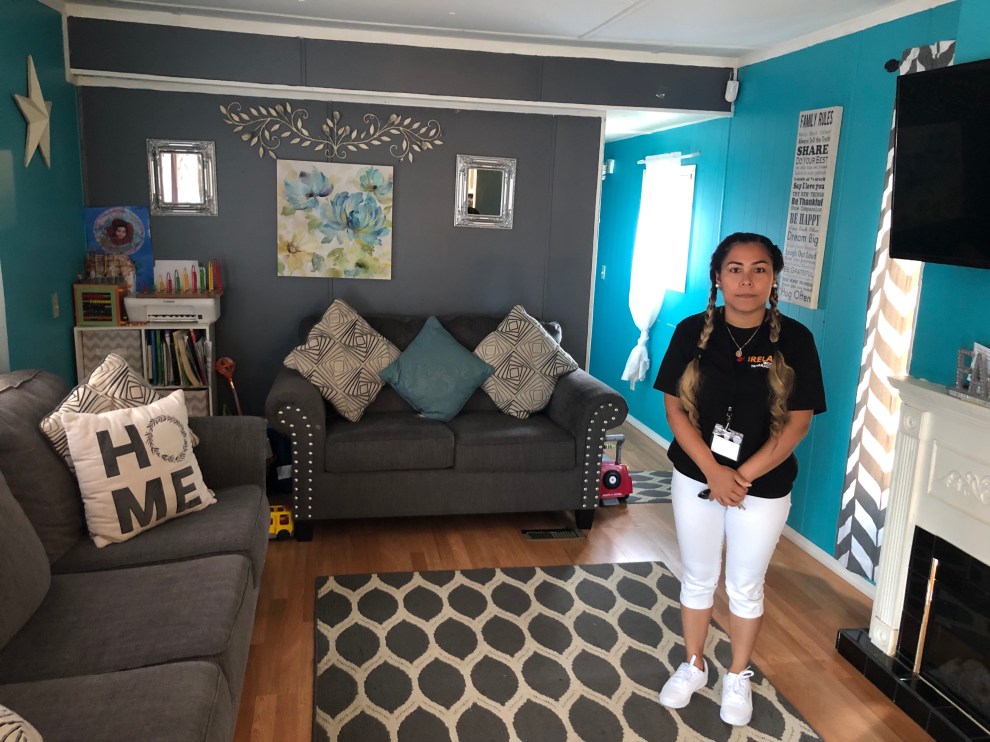
Patty Flores stands inside her mobile home in 2022. She feared that mold there had caused her son's respiratory problems.
Melissa Hellmann / Center for Public Integrity
Her experience is a common one. An analysis by Washington state’s Tax Structure Work Group revealed that those earning between $17,000 and $30,000 per year pay 15% of their annual incomes in Washington state and local taxes—substantially reducing their take-home pay.
By contrast, the wealthiest 10% of Washingtonians—those making at least $208,000—pay only 3.4% of their annual incomes in state and local taxes.
Wealth inequality is growing, and “taxes are an important tool at all levels of government for pushing back against that,” said Washington Budget and Policy Center Senior Fellow Andy Nicholas. “And yet, we have a tax code that not only doesn’t push back against that but makes it worse.”
But recent changes that make the system slightly more equitable are starting to kick in. The Working Families Tax Credit—a state version of the federal Earned Income Tax Credit—went into effect this year and offers up to $1,200 for low- to moderate-income working households in Washington. As many as 400,000 Washingtonians may receive the credit. The deadline to apply for the 2022 tax year is Dec. 31, 2023.
The capital gains tax will increase annual state and local taxes for the wealthiest earners by half a percentage point on average, while the Working Families Tax Credit will lower the same taxes by 1.1 percentage points for the lowest earners, according to the Institute on Taxation and Economic Policy.
Nguyễn, the Seattle-area legislator, co-sponsored a wealth tax bill in this year’s legislative session that would impose a 1% tax on individuals owning financial assets including stocks, bonds, and mutual funds exceeding $250 million. Revenue would go toward education, affordable housing, disability services, and a tax credit for low-to-moderate-income people.
The state’s Department of Revenue estimated that the tax would collect $3.1 billion per year beginning in 2026 from around 700 Washingtonians, some of whom are the wealthiest people in the world.
“The main wealth-building tool of the middle class has always been our homes, and we already tax that,” state Sen. Noel Frame, a Democrat who represents Seattle, said during a March 9 Senate committee hearing. “But the main wealth-building tool of the billionaires and ultra-millionaires is financial property, and we don’t tax that at all.”
The Seattle-based Economic Opportunity Institute worked with the Legislature to help draft the proposed tax on what’s known as “unrealized” capital gains. For the organization’s Carolyn Brotherton, wealth is an iceberg. Realized capital gains—what the state just began taxing—serve as the tip of the iceberg, while “unrealized capital gains are everything floating beneath the surface,” she said.
The proposal has stalled in committee.
A major claim leveled against these types of measures by the groups opposing them: People and companies will be driven out.
“A lot of businesses are leaving the state,” Lance Christensen, California Policy Center’s education policy and government affairs vice president, said in an interview with Public Integrity. The group is a State Policy Network affiliate that dismissed a California wealth-tax proposal as a “goofy” union effort. “Once they decide they can’t do business here, they’ll move to Texas, Florida, Tennessee.”
Over 30 multimillionaires and billionaires left Norway in 2022, according to the local newspaper Dagens Naeringsliv, after the nation increased its existing wealth tax.
But a growing body of U.S. research shows that while some rich people migrate out of state because of increased taxes, most stay. A recent Center on Budget and Policy Priorities report showed that lower-income households are more likely to move out of state than higher-income people across 41 states.
“Wealthy people, like all of us, are embedded in our communities. [They] have businesses in the state, go to church, have family and communities in those specific places. Those connections root everybody, including wealthy folks,” said State Innovation Exchange’s Huelsman, who sees the “millionaire tax flight” argument as an empty threat designed to maintain an unfair tax code.
Case in point: Shortly after Massachusetts’ voters agreed to raise taxes on millionaires, the Lego Group toy company announced its plans to relocate its Americas office to the state.
Originally from Michoacan, Mexico, Flores moved to Aberdeen 17 years ago to pursue the American dream. To her, that meant access to affordable housing, health care, and child care. With a more equitable tax system, Flores believed that could be possible.
But the mother of two struggled to find affordable child care. She’s not alone. Flores’ sister quit her job at a local grocery store to avoid hiring a babysitter. Instead, she took up cleaning houses so she could bring her children with her.
For Flores, the gulf between the dream and reality was large. She walked through the mobile home park where she lived in July 2022, pointing out the signs of decay.
“I have hope,” she explained later that afternoon, over a lunch of pupusas in the Firelands office. “That’s why I’m still here.”
That summer, Flores and her family managed to buy a house—a place with no mold. A year later, her 5-year-old son Mathias is healthy and breathes easily. She now works full-time as a Firelands organizer.
They are inching closer to a more comfortable life. But there’s still a long way to go.
“When the American dream comes true is when we have equity,” Flores said.


